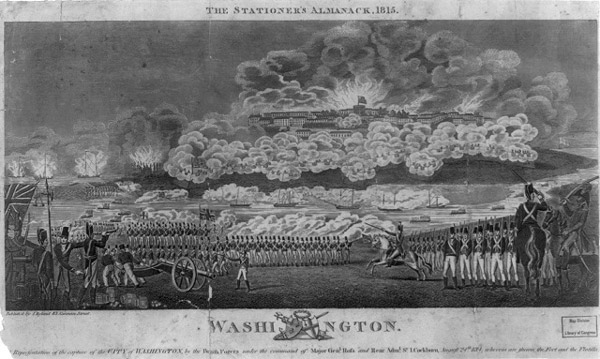In the hot, humid summer of 1814, British troops advanced on Washington, DC. Their only obstacle was American troops guarding the heights at Bladensburg, Maryland, ten miles outside the capital. After a brief battle, the Americans took flight in their most humiliating defeat of the war, and British troops captured Washington.
"as soon as they arrived on even ground with him, he fled in every direction" British commander describing fleeing American soldiers

Library of Congress, Prints and Photographs Division
On August 24, 1814, a British army arrived at Bladensburg, Maryland, intent on crossing the Anacostia River and capturing the American capital city of Washington. American troops and artillery waited on the heights overlooking the bridge the British would cross.
The Americans had the advantage, holding high ground with roughly 5,000 men opposing a smaller British force of 1,500. However, in their hurry to defend the capital, American officers had placed their men haphazardly, leaving gaps in their line. The American Commander, General William H. Winder, had only a vague sense of his troops’ placement.
A single regiment of British troops bypassed the bridge and forded the river north of the crossing, threatening the Americans’ left flank. Under a barrage of British rockets, the American militia fled, opening the way for the British to advance.
As their line crumbled, the American retreat became a rout. Soldiers ran for safety or rushed home to protect their families. A British naval officer noted his side had captured prisoners, but not many— the Americans had fled too quickly to be rounded up. The Americans eventually withdrew beyond the city into Virginia and Maryland. Soon after, for the first and only time, a foreign nation captured the United States capital.
Reporting to the Secretary of War, Winder chose his words carefully. “The contest,” he wrote, “was not as obstinately maintained as could have been desired.
An October 7, 1814 newspaper article about the humiliating defeat described the hasty retreat as “The Bladensburg Races.” By January 1815, the phrase was common enough that it became the title of a popular poem depicting the president’s flight from the city.
The defeat at Bladensburg allowed the British army to enter Washington and burn public buildings, one of the most significant events of the war. Some historians have suggested the rout was the most disgrace ever dealt to American soldiers. Together, the Bladensburg Races and subsequent burning of Washington marked the lowest point of the war for the young American military.
Last updated: May 24, 2016
